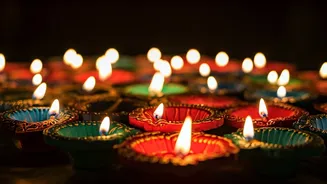Diwali 2025 Date
The anticipation for Diwali, the annual festival of lights, has begun. The exact date of Diwali varies each year based on the Hindu lunar calendar. In
2025, Diwali is expected to be celebrated either on October 20 or October 21. Determining the correct date allows for proper planning and preparations for this significant occasion. This includes purchasing gifts, decorations, and planning festive gatherings. The ambiguity surrounding the date underscores the importance of staying informed and consulting reliable sources for the most accurate information. Diwali's date is linked to the Amavasya, or new moon day, in the month of Kartika, according to the Hindu lunar calendar. The date shifts year to year; the precise determination can only be made by considering the alignment of the moon, sun, and other astrological factors. Stay informed to ensure you are ready to participate in the celebration.
Rituals and Traditions
Diwali is steeped in rich traditions, which have been passed down through generations. These include various customs and rituals performed across India. Homes are adorned with colorful decorations, including diyas (oil lamps), rangoli (colorful patterns), and strings of lights. Families partake in Lakshmi Puja, a ceremony to honor the goddess of wealth and prosperity, seeking blessings for a prosperous year ahead. Exchanging gifts, especially sweets and dry fruits, is a common practice, symbolizing the sharing of joy and love. The lighting of lamps signifies the triumph of light over darkness and good over evil, a core theme of the festival. Bursting firecrackers is another key part of the celebration. Wearing new clothes and preparing special festive meals are essential components of the Diwali experience, adding to the joyous ambiance. The Diwali celebrations represent a time for new beginnings, family bonding, and the renewal of hope and optimism.
Lakshmi and Ganesha
Worshipping Goddess Lakshmi and Lord Ganesha is a central part of Diwali celebrations. People offer prayers and perform pujas to seek blessings for prosperity, wisdom, and the removal of obstacles. Specific foods are often prepared and offered to the deities during the puja. Traditional foods like laddoos, barfi, and kheer are prepared. These offerings are seen as expressions of devotion and gratitude. The significance of Lakshmi and Ganesha extends beyond religious rituals; they also represent the values of prosperity, well-being, and the removal of negativity from life. The inclusion of these deities in the Diwali festivities highlights the importance of faith and spirituality in Indian culture. Lakshmi embodies prosperity and good fortune, while Ganesha, with his benevolent demeanor, is celebrated as the remover of obstacles and the harbinger of success.
Diwali Shopping and Gifts
Diwali is a time for festive shopping and gift-giving. Families and individuals buy new clothes, jewelry, household items, and gifts to celebrate the occasion. The markets are filled with vibrant displays of traditional clothing, festive decorations, and other essentials. Exchanging gifts with loved ones is an important custom. Popular gifts include sweets, dry fruits, and other items. The act of giving and receiving gifts signifies the strengthening of relationships and the sharing of happiness. Diwali shopping plays a significant role in stimulating the economy, with increased retail activity. It's a time when businesses and consumers come together, making it a culturally significant time for commerce as well. From traditional attire to modern gadgets, the choices are varied and cater to diverse preferences and budgets.
Diwali Cuisine
The culinary aspect of Diwali plays an important role, with families preparing traditional dishes. A wide array of sweets, savories, and festive foods are cooked and enjoyed during the celebration. Various Indian cuisines contribute to this festive feasting. Classic dishes like ladoos, gulab jamun, and various types of namkeen are commonly prepared and shared. Families often spend time together preparing these dishes, creating a sense of camaraderie. These culinary traditions add to the overall festive spirit, turning Diwali into a sensory experience. The food consumed is as diverse as India’s regions, so food plays a vital role in Diwali celebrations, bringing families together. Food is not only a means of nourishment but also a symbol of sharing, love, and community during Diwali.
Fireworks and Safety
Fireworks are a core element of Diwali celebrations, lighting up the night sky with vibrant displays. It's important to prioritize safety precautions to avoid accidents during the fireworks. Guidelines such as setting off fireworks in open areas and keeping a safe distance should be followed. Children must be supervised to minimize risks. Fire safety protocols, like having water nearby, are essential to handle any unforeseen circumstances. Fireworks should always be handled responsibly to maintain a safe and enjoyable environment during the festival. Awareness of fire safety protocols is paramount during Diwali. Additionally, environmental consciousness is essential, so people can celebrate Diwali safely. While fireworks are a vital aspect of Diwali, understanding and adhering to safety precautions ensures everyone has a joyous experience.













